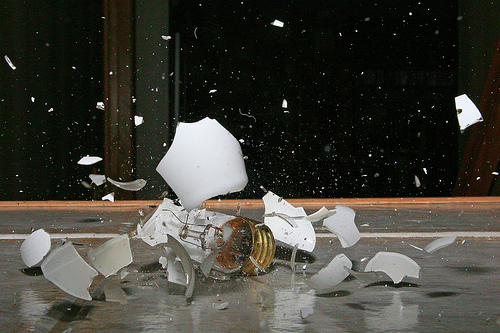More gold has been mined from the thoughts of men than has been taken from the Earth. – Napoleon Hill
What does that mean?
I’d heard this stated as “there was more wealth in one grave-yard than all the gold-mines of the planet.” Not the buried loot, but the ideas left unexploited, hidden, held secret by the dead.
This quote says the same thing, but in a slightly different manner, speaking of the ideas of the living, whereas the way I heard it, it spoke of the ideas taken to the grave.
Why is innovation important?
More gold has come from the minds of mankind than all the gold mines of the Earth. Think about that. How much gold would the Pharaohs of ancient Egypt have given for a jack hammer setup (and a few spare parts)? What about a cargo container full of steel picks or chisels? How about a little air conditioning or some sun screen (even some SPF-10)? How about an anti-venom kit for an Asp bite? I know, she did it on purpose, but I’m sure others died from snakebite, right?
So many people are afraid their idea won’t work, or afraid it will be an embarrassment or a commercial flop (which can happen even to properly functioning inventions). Others are afraid to talk about it, for fear it will be stolen from them by someone else, who will then get the fame and fortune. So, these ideas are never brought forth. And all humanity is poorer for it (or lack of it, in this case).
Innovation is defined at thefreedictionary.com as “the act of introducing something new.” It is the act of improving or creating from older pieces, something new and wonderful. Look at how the field of medicine has flourished from innovation. Yet still we have people who, by being invested in the existing system, resist innovation.
Whether it was the origin of germ theory or sanitary practices with child birth, there was tremendous resistance to the innovation. Where would we be if the pioneers had yielded to the pressure and not pursued their theories? How much gold would equate to just the last 10 years of anti-viral innovations? Does innovation sound a little more important now? Do you have a little more respect for the innovator?
Where can I apply this in my life?
As the Wright brothers were early innovators (along with hundreds of others worldwide), so too can ordinary people today. Yes, the heirs of Wright are now building space craft (suborbital at first, but Kitty Hawk wasn’t exactly impressive by today’s standards) and are experts, many with multiple advanced degrees, not all innovations occur at the edges of science.
If you’ve ever been up all night, you’ve seen infomercials. Some of them are for ways to get wealthy, using someone’s innovative method. Most are for various innovations. The folding, adjusting and telescoping ladder was one item that got it’s start there. So were many household cleaning products that are now common, either bought by the big companies, or reverse engineered and duplicated (and often innovated or improved on) for our use.
You have even seen (perhaps not) some of the TV shows featuring invention. There are some weird stuff on those shows, but also some stuff that ends up in your closet. How about dusting? How many of you are old enough to remember cloth diapers that had been re-purposed as dust rags?
The first innovation was the spray-on dust attracting stuff, followed by the innovative thought of adding a pleasant smell to the spray and, later, a wood conditioner as well. Then came microfiber cloths, and we had dedicated, purpose built dust collecting cloths. But what about the high ceilings and the fans that are way up there? How many different innovations have come along just to clean the dust off ceiling fans? How many of them were rocket scientists? Probably not too many.
What ideas do you have? What have you seen everyone else do, and been taught to do yourself, that you said, “Wait, there’s a better way!”? Perhaps it’s just a different way that is easier for you or quicker or gets better results. Does it have to be a million dollar idea? No, it doesn’t have to be, but it might be. You never know.
Have you ever seen something on TV, a commercial or infomercial, and said, “Hey, that was MY idea!”? I know I have. Personally, I don’t mind if someone else gets the credit, or even the money. To me, it’s not about that, it’s about moving the ball forward. Helping people do things quicker, easier or better. Improving their lives. Besides, seeing something I thought of on TV means my brain still works and can come up with great ideas, even if I don’t have the follow through to take it to market.
With that as a preamble, let’s get out the paper and start a list. Write down all your crazy ideas for products, improvements, methods or whatever. Even list things you’ve seen on TV for which you had a similar idea (you might be able to improve it). Don’t limit yourself to things you think will be a commercial success (the usual implication of gold), but anything that will help any of the people of this wonderful little planet of ours. Methods of growing crops or gardens, methods for dealing with pets or small children (there is a surprising amount of crossover in methods – not treating your kids like pets, but your pets like kids, but I digress again). There are nearly infinite possibilities, so keep the list handy in case you come up with another idea the next time you’re in the shower.
For each idea, write down what you need to prove it works (ie to convince someone that your idea is actually better, not just that it sounds neat). Brainstorm on how to do it as simply and easily (and inexpensively) as possible. What materials will you need, what will it take to make a prototype (if it’s an invention) or what materials will be needed (if it’s a process). Write down the steps and turn it into a plan (well, at least a couple of them at first). There, you now have a couple fairly well documented ideas, feel smarter already?
Now, what to do with the idea. I have no knowledge about the commercial aspects of this, so you’re on your own to research that. I do know there are shows where people get booths and show off their ideas, in the hope of getting a contract for product development (seen from time to time on late night TV shows or even the evening news), so that might be a place to start. For the rest of the ideas, how do you distribute them?
I would start by talking to people with similar interests. As long as you have a thick skin and can handle a little less-than-constructive criticism, or even someone having a better way, it can be a great way to improve your innovation. You can also share the idea with people who have the need for the idea. If it’s a great new way to dust, talk to friends who actually dust their house some, or give a demonstration to someone who doesn’t dust often.
This is a wide open field, and the chances of riches are slim, but if you just want to share some ideas, and work with others to make your innovation even better, you’re going to need to open up to other people, and let your idea out into the cruel world. It’s never fun to see an idea demolished, or to have to admit that someone else truly have a better idea. But if the purpose is something other than feeding your ego, hopefully you can take it in stride.
You may think this kind of innovation is a radical new idea, but it goes back at least to the 1950’s, when people would share tips for a great lawn, brighter white sheets and the best ever spaghetti sauce over the fence of the back yard with their neighbors. Perhaps it goes back even farther with knitting bees and quilting circles. Perhaps it goes back even farther, to those early ancestors, huddled around the fire, trading tips on the best way to invite an antelope to dinner or where to find the juiciest berries or fruit.
To me, the most important thing we can do as members of the human race (after completing our work on continuing it’s existence) is to improve the quality of life for ourselves and the generations to come. Got any good ideas? Don’t take them to the grave!
From: Twitter, undocumented feed (my bad)
confirmed at: http://en.wikiquote.org/wiki/Talk:Napoleon_Hill unsourced, middle of page
Photo by LASZLO ILYES







